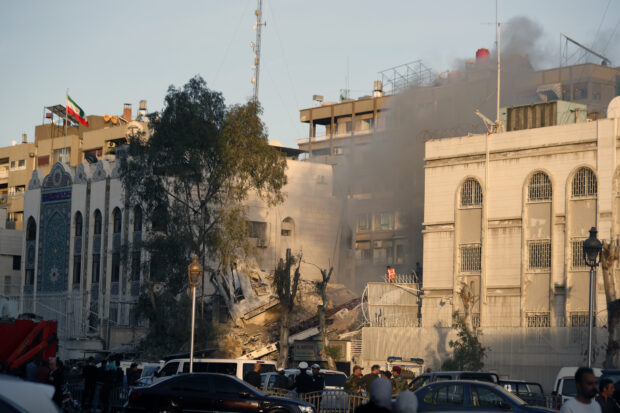Iran vows revenge after Israeli airstrike kills two top commanders

Emergency services work at a destroyed building hit by an air strike in Damascus, Syria, Monday, April 1, 2024. An Israeli airstrike has destroyed the consular section of Iran’s embassy in Damascus, killing or wounding everyone inside, Syrian state media said Monday. AP PHOTO/OMAR SANADIKI
DAMASCUS, Syria — An Israeli airstrike that demolished Iran’s consulate in Syria killed two Iranian generals and five officers, Syrian and Iranian officials said Monday.
The strike appeared to signify an escalation of Israel’s targeting of Iranian military officials and their allies in Syria, which had already intensified following the Oct. 7 attack on Israel by Hamas militants, who receive money and weapons from Iran.
Clashes have also increased since then between Israel and Hezbollah — another militant group supported by Iran — along Israel’s northern border with Lebanon.
READ: Israel warns ‘another war’ as Hezbollah strikes sensitive base
READ: Israeli envoy: Iran is a problem
Article continues after this advertisementIsrael, which rarely acknowledges such strikes, said it had no comment on the latest attack in Syria.
Article continues after this advertisement2 generals
The attack in Syria killed Gen. Ali Reza Zahdi, who led the elite Quds Force in Lebanon and Syria until 2016, according to Iran’s Revolutionary Guard. It also killed Zahdi’s deputy, Gen Mohammad Hadi Hajriahimi, and five other officers.
While Iran’s consular building was leveled in the attack, according to Syria’s state news agency, SANA, its main embassy building remained intact.
Iran’s ambassador, Hossein Akbari, condemned Israel and said as many as seven people were killed. First responders were still searching for bodies under the rubble. Akbari said two police officers who guard the building were wounded.
He vowed revenge for the strike “at the same magnitude and harshness.”
READ: Iran warns of ‘far-reaching consequences’ if Israel not stopped
The chief spokesman for Israel’s army, Rear Adm. Daniel Hagari, said late Monday that a drone attack on a naval base in southern Israel early Monday was “directed by Iran.” There were no injuries and only minor damage to a building, the army said.
The Palestinian militant group Islamic Jihad, which is also backed by Iran, accused Israel of seeking to widen the conflict in Gaza.
‘Major escalation’
Charles Lister, director of the Syria program of the Washington-based Middle East Institute think tank, called the strike a “major escalation.” The attack is sure to draw retaliation, he wrote on the social media platform X.
Syria’s foreign minister, Faisal Mekdad, said “several” people were killed, and in a phone call with his counterpart in Iran, he condemned Israel.
A spokesman for Iran’s foreign ministry, Nasser Kanaani, called on other countries to condemn the strike. Iranian state television said the Iranian ambassador’s residence was inside the consular building, which stood next to the embassy. The main embassy remained intact.
Israel has carried out hundreds of strikes on targets in government-controlled parts of Syria in recent years.
Such airstrikes have escalated in recent months against the backdrop of Israel’s war against Hamas in the Gaza Strip and ongoing clashes between Israel’s military and Hezbollah on the Lebanon-Israel border.
READ: Hamas’ unprecedented attack on Israel raises Iran influence questions
Though it rarely acknowledges its actions in Syria, Israel has said it targets bases of Iran-allied militant groups such as Lebanon’s Hezbollah, which has sent thousands of fighters to support Syrian President Bashar Assad’s forces.
An Israeli airstrike in a Damascus neighborhood in December killed a longtime adviser of the Iranian paramilitary Revolutionary Guard in Syria, Seyed Razi Mousavi.
A similar strike on a building in Damascus in January killed at least five Iranian advisers. Last week, airstrikes over the strategic eastern Syrian province of Deir el-Zour near the Iraqi border killed an Iranian adviser. AP